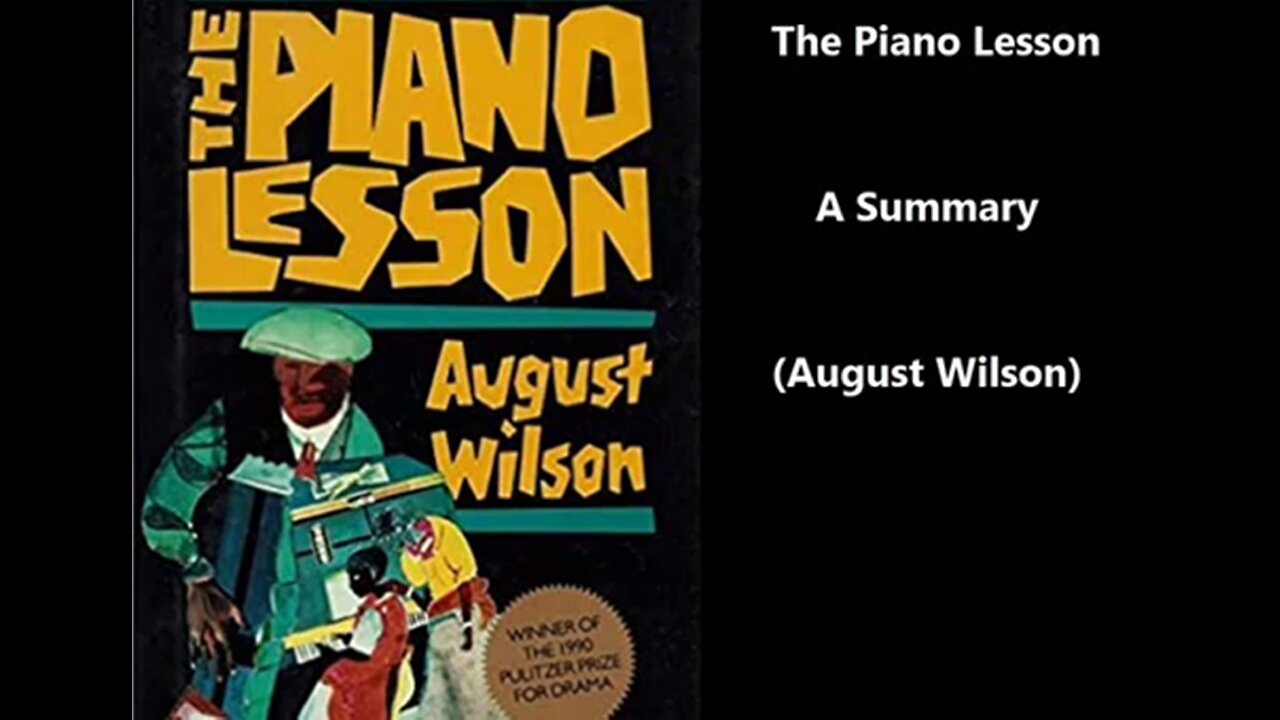Premium Only Content

Summary: The Piano Lesson (August Wilson)
"The Piano Lesson" is a renowned play written by American playwright August Wilson. It is a part of Wilson's ten-play series known as The Pittsburgh Cycle, which explores the African American experience in the 20th century. "The Piano Lesson" specifically delves into themes of family, heritage, and the legacy of slavery in America. The play was first performed in 1987 and has since become a significant work in American theater, earning acclaim for its powerful storytelling and rich character development.
"The Piano Lesson" is set in the 1930s and takes place in a Pittsburgh household owned by the Charles family. The play primarily focuses on a brother and sister, Boy Willie and Berniece, who clash over the fate of a valuable family heirloom—a beautiful, intricately carved piano.
Boy Willie arrives in Pittsburgh from Mississippi with the intention of selling the piano to buy land that was once owned by their ancestors, who were slaves. He believes that owning the land will symbolize the family's progress and independence from their painful history. However, Berniece, his sister, refuses to part with the piano. She sees the piano as a symbol of their family's heritage, a reminder of the sacrifices made by their ancestors during slavery, and a connection to their cultural roots.
The conflict between Boy Willie's desire for financial independence and Berniece's desire to preserve her family's history and honor their ancestors forms the central tension of the play. As the two siblings struggle over the piano's fate, they are joined by a cast of complex characters, including a preacher named Avery, a mystical visitor named Wining Boy, and a troubled ghost from their past.
Through powerful dialogue and symbolism, "The Piano Lesson" explores the legacy of slavery, the importance of cultural heritage, and the ways in which the past continues to shape the present. It grapples with questions of identity and the price of progress, ultimately offering a moving and thought-provoking examination of the African American experience in the United States. August Wilson's play is celebrated for its rich characters, deep themes, and its ability to resonate with audiences across generations.
-
 1:06:40
1:06:40
Donald Trump Jr.
12 hours agoThe Left is Taking one L After Another, Live with Michael Knowles | Triggered Ep. 217
159K110 -
 47:17
47:17
Kimberly Guilfoyle
12 hours agoWoke Gets DOGE’d, Live with AJ Rice & Jarrett Stepman | Ep. 197
119K42 -
 20:11
20:11
Candace Show Podcast
10 hours agoBecoming Brigitte: Candace Owens x Xavier Poussard | Ep 6
178K318 -
 8:25:38
8:25:38
Dr Disrespect
15 hours ago🔴LIVE - DR DISRESPECT - ELDEN RING DLC - REVENGE
185K22 -
 54:22
54:22
LFA TV
1 day agoThe End of the Trans-Atlantic Alliance | TRUMPET DAILY 2.17.25 7PM
44.7K6 -
 55:56
55:56
BIG NEM
13 hours agoUGLY COCO: The Rapper Who’s Tried EVERY PSYCHEDELIC 🌌
18.3K1 -
 1:42:51
1:42:51
2 MIKES LIVE
11 hours ago2 MIKES LIVE #181 Deep Dive Monday!
23.6K3 -
 1:57:43
1:57:43
Quite Frankly
12 hours ago"Low Tide at The Pier: Munich Tears" 2/17/25
35.2K19 -
 27:44
27:44
The Based Mother
12 hours ago $0.72 earnedBOOK BAN LIES. Karen England and the MSM fairy tale that books are being “banned” by fascists
17.1K3 -
 1:01:52
1:01:52
In The Litter Box w/ Jewels & Catturd
1 day agoBest Presidents' Day Ever! | In the Litter Box w/ Jewels & Catturd – Ep. 743 – 2/17/2025
111K66